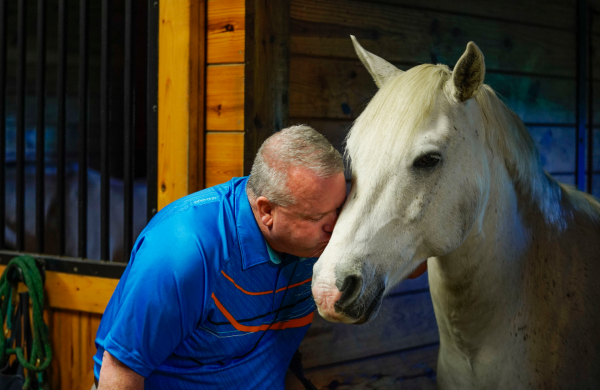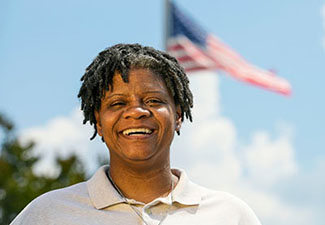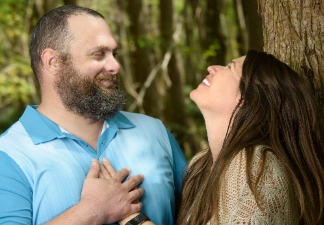Taking the Stress Out of Finding Mental Health Care

Military personnel excel at following orders and executing missions. However, many veterans struggle with having a clear direction when transitioning from service, which can lead to increased stress, anxiety, and depression.
For Army veteran Chris Hoff, being medically retired due to a traumatic brain injury (TBI) gave way to a lot of emptiness.
“I was my biggest critic. I thought I had failed my country since I couldn’t be a soldier anymore," said Chris, who struggled silently from the effects of the TBI as well as post-traumatic stress disorder.
A well-timed phone call from a family member foiled his suicide attempt and opened the door to a new perspective. “I realized I was more than a soldier,” he said.
A Team to Help
“My name is Christopher J. Hoff, and I need help. That’s the hardest sentence I had to say in my whole life,” Chris said. “But when I did, the doors opened for me. And I now have a whole team I can call.”
That team is the Mental Health Triage team, a group of specialized health professionals at Wounded Warrior Project® (WWP) who provide individualized guidance to warriors and their loved ones seeking to improve their mental health.
| A LIFELINE FOR WARRIORS |
|
If you or someone you know has suicidal thoughts, get help right away through one or more of these resources:
|
"Mental health is a journey with a continuum of different types of wellness programs and services. Every person’s path is unique, so trying to figure out what you need by yourself can be frustrating,” said Lyndsay Tkach, Mental & Brain Health Services director at WWP™. “We reduce the guesswork and take the stress out of the equation.”
When a warrior or loved one reaches out to WWP for mental health support, dedicated specialists around the country work to identify the person’s priorities and then connect them to the optimal type of care.
“All you have to do is say, ‘I want to feel better,’ Lyndsay explained. “Then we’ll work like a concierge service partner to listen to you, understand what’s most important to you, what your priorities are, and then match you with the most meaningful level of care or resource to meet you where you are.”
Navigating uncomfortable conversations, asking hard questions, and recognizing subtle remarks are among the unique skills of WWP’s triage team.
“We want to develop rapport so that we can uncover any potential areas of concern or identify other needs that might not be top of mind,” said Lyndsay, noting it is not uncommon to learn someone requesting mental health services may also be trying to cope with substance use or loss of employment.
“We will want to help them address those areas to ensure they are set up for success and achieve the best long-term results.”
Loved Ones Get Support, Too
The WWP triage team takes the same approach with military family members.
“If we speak to a caregiver looking for someone to talk to about stress, we can start there, but we may also connect them with our Independence Program team to learn more about respite care or other services available for them and their loved one,” Lyndsay said.

Taniki Richard appreciates that she and her entire family have access to WWP mental health resources.
Former Marine Corps Sgt. Taniki Richard appreciates that WWP can assist her whole family, including her husband Brandon, a retired Marine veteran, and two sons.
“Being a dual military family, it can be complex between our different roles and our needs – as veterans, as husband and wife, as partners, as parents,” said Taniki, who medically retired in 2012 after 11 years in the Marine Corps.
“There’s a lot of pressure when you’re going through something, and all your thoughts and feelings are mixed up. Not knowing where to turn for help is overwhelming. But with Wounded Warrior Project, you don’t have to have all the answers.”
When Taniki struggled to communicate with one of her children during the pandemic, she called WWP for guidance.
“I’ve learned to hold myself accountable, but Wounded Warrior Project got us connected to a resource that allowed me to really hear my son – and that made my son feel valued and supported.”
One Call, No Judgment
The other benefit of the team’s coordinated approach is that warriors don’t need to tell their stories repeatedly.
“I had started elsewhere and had told my story 7, 8, and 9 times. Every time I told it, I felt like people judged me. I was at the end of my rope,” said Chris.

Chris Hoff was surprised by how equine therapy helped improve his mental health.
He admits he was a bit perplexed, though, when WWP recommended he try a program that included equine therapy.
“At that point, I was willing to talk to anyone, but really, a horse?”
Much to his surprise, talking to the horse helped.
“I told that animal things I wouldn’t share with my wife. I’d walk and talk and wasn’t judged. I got so much from the experience and the other programs I participated in. I’m in a better place because of Wounded Warrior Project.”
Today, Chris, who serves as a peer leader for WWP, tells other warriors there is hope and to trust in the process.
“The idea of asking for help is a sign of strength, not weakness,” he said. "It takes a brave person to ask for help."
Read more about WWP’s programs and services that help warriors and their loved ones on their journey to mental health and wellness.
Contact: Cynthia Weiss – Public Relations, cweiss@woundedwarriorproject.org, 904.738.2589
About Wounded Warrior Project
Since 2003, Wounded Warrior Project® (WWP) has been meeting the growing needs of warriors, their families, and caregivers — helping them achieve their highest ambition. Learn more.


